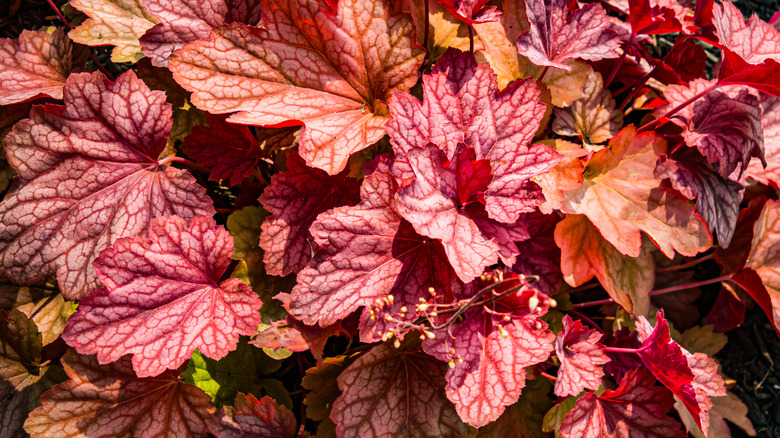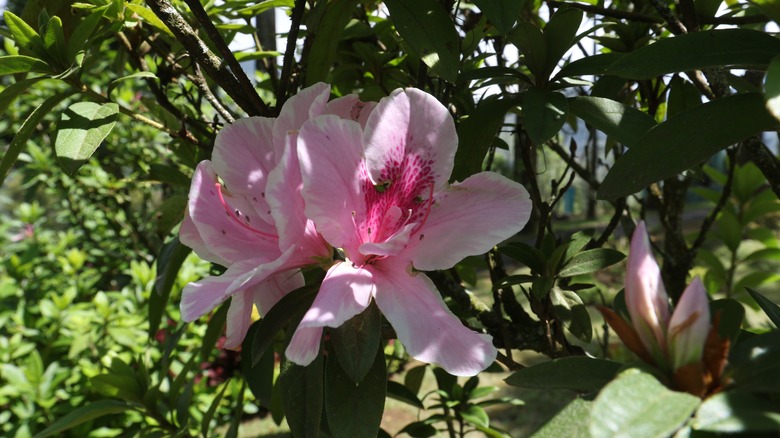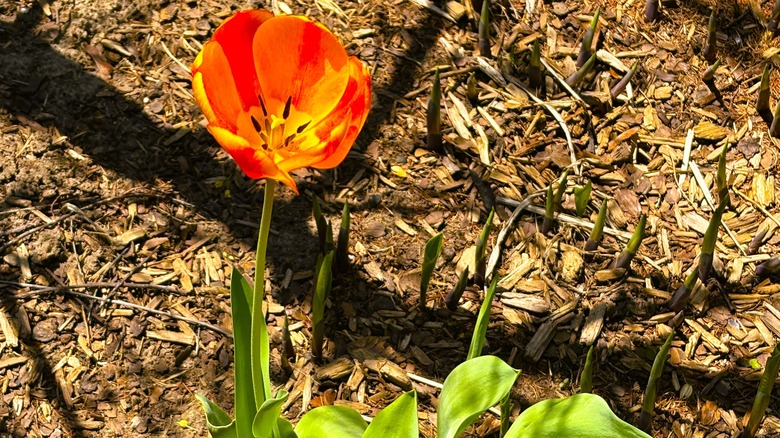7 Types Of Plants That Need Mulch In The Winter
Winter can be hard on the garden, so it's important to prepare your plants for frigid temperatures. Mulching is a great way to insulate plant roots from cold weather and protect them from the elements. But before you go crazy adding it to everything, it's important to note that not all plants need mulch in the winter. In fact, some plants that are kept too warm will start to bud, and then the cold temperatures will kill the new growth off. Knowing which plants you should always mulch in the fall makes all the difference. Less hardy types of plants, like shallow-rooted or newly-planted ones, will benefit greatly from winter mulching.
Mulch is made of organic material like bark, straw, or compost that improves the soil as it breaks down over time. Sometimes, mulch consists of inorganic materials like gravel and plastic, but these types of mulch do not break down into the soil and are not generally recommended for cold-weather mulching. In addition to explaining which plants to mulch, we'll talk you through the best type of mulch for your garden based on the type of plants you're working with.
Shallow-rooted plants
Plants whose root systems do not go deeply into the ground are referred to as shallow-rooted plants, like coral bells (Heuchera), astilbes, and hostas. These plants can be particularly vulnerable in the winter because soil is prone to lifting, or heaving, in extreme temperature changes, which exposes the roots to temperatures too cold for them to handle. Adding mulch to these types of plants will help stabilize the soil temperature and prevent heaving. Organic mulches like straw, leaves, or pine needles are good choices, and they decompose easily, which also adds nutrients to the soil.
Perennial herb plants
Perennial herbs that are winter-hardy in your zone are another plant type that can benefit from winter mulching. Adding 2 to 3 inches of organic mulch, like pine bark or wood chips, will help protect the roots and prevent heaving for perennial herbs such as mint and chives. Make sure not to pile too much mulch around the base of the stem, a mulch error that kills perennials by trapping moisture and causing rot.
Broadleaf evergreens
Broadleaf evergreens, like azaleas, boxwoods, and rhododendrons, are susceptible to winter burn, which can cause the leaves to brown and potentially kill the plant. Adding mulch to broadleaf evergreens helps regulate the soil temperature, extend the amount of time the plant roots can absorb water, and slow the moisture in the soil from evaporating, all of which prevents winter burn. The mulch will also protect against the freeze-thaw cycle that can stress the roots.
Newly planted perennials
Perennials that were planted in the last year or two need extra care in the winter since they have not yet had the time to develop a strong root system. This makes them more sensitive to winter damage and heaving. A good choice of organic mulch material is straw or chopped leaves. Apply the mulch once the plant has gone dormant, and use 2 to 4 inches for adequate protection.
Cold-hardy vegetables
If you're looking to grow cold-hardy winter vegetables like carrots, beets, or turnips, know that even these guys need a little help in freezing temperatures. Using mulch in your vegetable garden can help maintain much-needed moisture, moderate temperature, and keep excess weeds at bay. You can use any organic mulching material, like leaves, straw, or even shredded newspaper or cardboard. When you're ready to mulch, appky 1 to 2 inches of organic material or about five layers of newspaper.
Hardy herbaceous perennials
Hardy herbaceous perennials, like tulips, lilies, and peonies, have an incredible root system that allows them to survive the winter fairly well. Unlike tender herbaceous perennials that have to be dug up from the garden and stored indoors for the winter, hardy perennials can stay outdoors, but will benefit from a good mulching. Organic material like sawdust, chopped leaves, and compost can be applied in late fall. Lay the mulch up to the edge of the crown, being sure not to cover it. Remove any remaining mulch in the spring to allow for new growth.
Roses
Roses are a woody, deciduous perennial. Some winter-hardy roses, like the Knock Out or Buck rose bushes, don't need mulching. But shrubs like the hybrid tea, grandiflora, and floribunda roses do not have the same winter hardiness and need extra protection. In their case, mulch will greatly help insulate the soil and keep their roots from freezing. Dry leaves, wood chips, or chopped hay are good materials to use for mulching roses. Apply the mulch in a mound, 8 to 10 inches high. Apply it after a few hard frosts have passed, but before the soil completely freezes.







